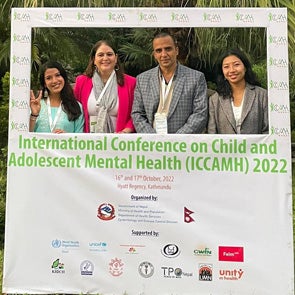 JoAnne Pandey (faculty, Child and Adolescent Development) became interested in advocating for students who had been sexually harassed after seeing reports of teachers who were harassing students at a school in Nepal where she had once worked and had also observed abuse. At that time she felt she didn't have the power or understanding to do more than report, but she pursued ways to help, and in 2022 attended the Second International Conference on Child and Adolescent Mental Health in Nepal. (Photo: Pandy is second from left, with other conference participants.)
JoAnne Pandey (faculty, Child and Adolescent Development) became interested in advocating for students who had been sexually harassed after seeing reports of teachers who were harassing students at a school in Nepal where she had once worked and had also observed abuse. At that time she felt she didn't have the power or understanding to do more than report, but she pursued ways to help, and in 2022 attended the Second International Conference on Child and Adolescent Mental Health in Nepal. (Photo: Pandy is second from left, with other conference participants.)
The conference brought together over 300 mental health professional and allied professionals. The theme of the conference was “Child and Adolescent Mental Health in COVID Era” and hosted four keynote presentations, 26 free paper presentations, 10 poster presentations, five symposia and three workshops. The research and work she shared were part of her research funded through CSUN’s Research and Sponsored Projects grant mechanism.
We asked JoAnne Pandey how her academic pursuits let her to the conference.
In 2019, I became interested in reports of sexual harassment of students by teachers in Nepalese schools after I saw an article in the Kathmandu Post about reports of 3 teachers who were harassing students at a school in Nepal.
This piqued my interest because I had once been a teacher at the school featured in the article, and during that time, I witnessed a teacher harassing his students and I also was harassed myself by a member of the administration. I felt that at that time I did not have the power or the understanding to do much more than report my observations, but that now I do have more knowledge and more power I would like to do more.
So, I worked with the Center for Advanced Studies of South Asia to organize a conference on sexual harassment in Nepalese schools that took place in Kathmandu in December of 2019. It was sponsored by Engage Nepal, Friends of Nepal Los Angeles, and I received some SEED support money from the Office of Community Engagement at CSUN.
Following that conference, I realized there was a lot of interest in the subject and also that there did not seem to be a clear definition of what sexual harassment is, even among Gender Studies professors and graduate students in Nepal. I applied for a Research, Scholarship and Creative Activity (RSCA) grant from CSUN for the 2020-2021 Academic Year in order to research culturally sensitive ways to measure incidences of sexual harassment and sexual abuse in Nepal.
Then COVID hit, and then I was awarded the grant. Unfortunately, because of the sensitive nature of the research, travel to Nepal for in-person research was important, so I was unable to continue the research until COVID restrictions were lifted for Nepal in the Spring of 2022. In the summer of 2022, I was finally able to go to Nepal to work on the project which was altered due to a shortened time frame in which to conduct the research. The focus was on finding a definition of sexual harassment (and sexual abuse) that was culturally appropriate for Nepal, and that was sensitive enough to be inclusive of marginalized communities that likely face disproportionately higher levels of harassment and abuse such as LGBTQIA+, Dalit, and persons with disabilities.
Upon returning from Nepal, I was invited to present at the International Conference on Child and Adolescent Mental Health in Nepal, by colleagues who were organizing the conference. I put together a team of researchers and students that I had been working with during my research over the summer to present a symposium that was called, “Current and future directions for research on the effects of sexual harassment and sexual abuse on mental health in Nepalese children, adolescents, and emerging adults,” and I was also asked to present a keynote speech on another topic. The focus of the conference was on child and adolescent mental health especially as relates to the COVID Pandemic.
I also appeared on a weekly televised program that is produced by one of the organizers of the conference, CWIN (Child Workers in Nepal) which is a social service organization that focuses on issues that face children, especially marginalized children, in Nepal. They televise the program and then post to their YouTube channel. (Interviews are in Nepali. See time marks 4:10 and 13:57 for my portions of the program.)
In the video, participants were discussing their thoughts about and reactions to the conference. Most were very positive, talking about the importance of learning about programs and research happening in Nepal, and how helpful it was to gather with so many other mental health professionals in one place because sometimes they feel isolated in their work. Some discussed ways that the conference could be improved. For instance, we were all being interviewed in Nepali, the conference presentations and proceedings were in English, and one man was saying that he would have liked to see more presentations in Nepali language.
Sp 2023
JoAnne Pandey/Child and Adolescent Development
